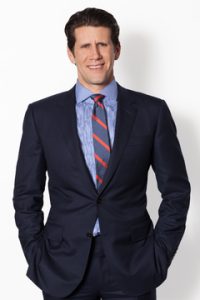Go to Page Section:
- Thanks, Doug, for taking time out of your busy schedule to speak with us. Can you begin by telling us a bit about yourself and your educational background?
- What is Employment Law, and why is it important?
- What made you choose employment law over other law specialties?
- What does a typical day look like for you?
- What skills would you say are vital to be an effective employment attorney?
- What are some of the things you like about being an employment lawyer?
- Is there anything you don’t like about being an employment lawyer or find challenging?
- What advice would you give to someone wanting to become an employment lawyer?

Douglas Lipsky, Employment Lawyer
Douglas Lipsky, a practicing employment attorney and co-founding partner of Lipsky Lowe, LLP was kind enough to grant us an interview with him to help gain some insight into what it’s like being an employment lawyer.
Thanks, Doug, for taking time out of your busy schedule to speak with us. Can you begin by telling us a bit about yourself and your educational background?
I graduated from Seton Hall University School of Law in 2003.
Following graduation, I practiced exclusively employment law on the management side for almost 10 years, working at premier nationwide firms.
I then left Big Law to start my practice focusing on representing smaller businesses and individuals.
What is Employment Law, and why is it important?
Employment law governs the rights of employees and employers in the employee-employer relationship.
Employment law is significantly important because the majority of Americans spend more time at their job than at home.
It is therefore critically important that your rights are protected on the job.
An individual should, for example, be able to come to work and just work, without fear of discrimination or harassment.
While the majority of employers are law-abiding, some are not, and that is where employment law and employment lawyers become relevant.
What made you choose employment law over other law specialties?
Employment law, unlike some areas, has a uniquely human quality to it: it looks at the dynamics between how employees interact with each other and their supervisors.
It is also more fluid than most areas.
For example, just this past week, the U.S. Court of Appeals for the Second Circuit unequivocally held that Title VII protects against sexual orientation-based discrimination.
Social media is another example.
Can an employer fire someone for what they post on Facebook or Twitter?
That was a question nobody was asking a few years ago.
It is, however, now highly relevant.
In addition to that, I knew early on that I wanted to litigate and be in court.
Employment law allows for, probably more than in other areas, young attorneys to get in-court experience.
What does a typical day look like for you?
I spend about 85% of my day working on existing cases: talking with my clients, talking with other attorneys, or I am in court.
The other 15% of my day is spent speaking with, emailing, or meeting with prospective clients.
What skills would you say are vital to be an effective employment attorney?
You need to be curious and have empathy.
Employment cases often have many layers to them.
A good employment attorney keeps asking questions, whether you are representing the employer or the employee, to find out exactly what happened.
These cases are often won or lost in the weeds.
On top of that, you need to have empathy.
Someone who is alleging she is a victim of discrimination feels hurt and wants justice.
To be an effective advocate, you need to empathize with what they experienced because that helps you better understand what happened and, in turn, makes you fight for them even fiercer.
What are some of the things you like about being an employment lawyer?
It is wonderful to help small businesses who want to treat their employees properly and work with them to set up the necessary policies and practices.
It is equally wonderful to help an individual get the justice they want.
One of my favorite examples is when a client brought his entire family to my office to collect his settlement check because he had never received a check that large and wanted his whole family to experience it.
Is there anything you don’t like about being an employment lawyer or find challenging?
Like most litigation, it can be too adversarial.
Some lawyers focus too much on the other lawyer, versus the facts.
This tends to create unnecessary tension when the lawyers ultimately need to work together on numerous issues: discovery, scheduling, and a resolution.
What advice would you give to someone wanting to become an employment lawyer?
Get experience representing employers and employees.
One of the reasons I am so effective and successful in representing employees is my ten years of representing employers.
I know how the other side thinks and can strategize around that.
I also know the client issues my adversary is dealing with and that helps to build trust, which allows us to work together on resolving the case in a more efficient and effective manner.


Fascinating insights from Douglas! As someone considering a legal career, it’s invaluable to hear about the day-to-day realities of working in employment law.
As an employment lawyer myself, I can attest to the dynamic nature of the field. Every case brings unique challenges and opportunities to advocate for fairness and justice in the workplace.
I’ve been considering a transition into employment law, and the insights shared here are invaluable.
One aspect I love about being an employment lawyer is the chance to help businesses navigate complex regulations while also safeguarding the rights of employees.